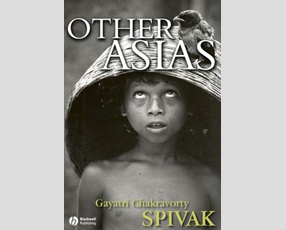This essay collection plus one interview is easier to read than many of Spivak’s other publications, but that doesn’t mean it’s less complex—or, like, “easy,” for that matter.
While I keep enthusiastically disagreeing with her on a whole range of issues, reading her books considerably broadens the horizon. Also, Spivak has a way of putting questions in your mind you wouldn’t have thought of asking. Since one couldn’t possibly write a review of any of Spivak’s works without writing a full-fledged and rather longish essay, I’ll limit myself to merely touching upon one general aspect that consistently arises in her texts, and is again highly visible in Other Asias.
This would be her approach to contrast “global do-gooders” from the Northern sphere on the one hand with basic field work (which she does, teaching rural children in West Bengal on a regular basis) and the proximity to the “native informant” (or subaltern) on the other. Which, in turn, corresponds to her concepts with regard to the importance of literature where “a training in literary reading teaches us to learn from the singular and the unverifiable” (228), a strong argument she has not only brought forward but substantiated throughout her work.
But I would argue that the havoc wrought by her “do-gooders” cannot be broken down exclusively to being misinformed and/or informed/constrained by Northern “global economics”; rather, the principle of exponential effects in complex cause-effect relationships plays a major part. Exponential effects would be negligible indeed in the context of basic field work, where any action would be much less likely to misfire. But things are also much less likely to change on a larger scale in the wake of basic field work by virtue of being “weak causes”; and, over and above, if these causes happened to actually be strong enough to engender more substantial change, the complexity would increase and with it the likelihood of exponential effects that will render whatever change is affected increasingly uncontrollable. If effects from basic field work ever exceeded those affecting, say, a single rural village, the field work would soon be unable to keep its systemic “purity.”
Along with its motivational purity, one might add—which always informs Spivak’s perspective (and where she keeps being very much informed and influenced by Kant): a purity that goes against the grain of the more pragmatically inclined, and that includes yours truly.
If you have something valuable to add or some interesting point to discuss, I’ll be looking forward to meeting you at Mastodon!

